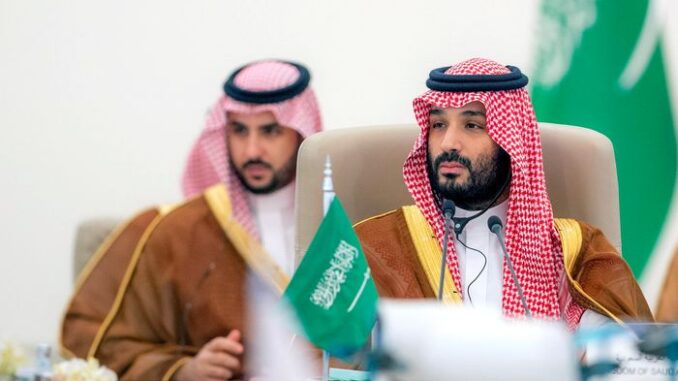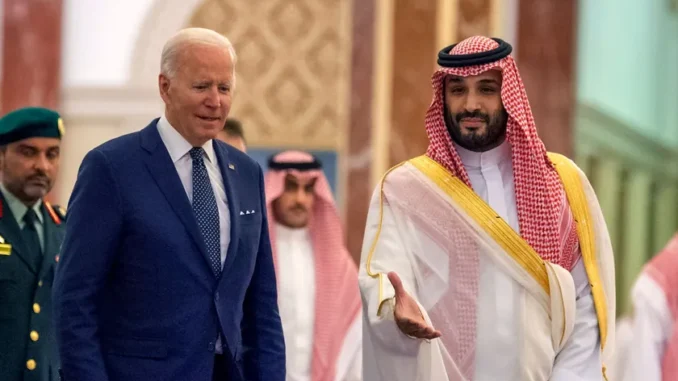U.S. National Security Council said no framework has been agreed upon, despite the Wall Street Journal reporting that the deal could happen within one year
By Amir Tibon AND Ben Samuels, HAARETZ
On Wednesday, the Wall Street journal reported that U.S. officials said Israel will make concessions to the Palestinians in order to facilitate the agreement. Those same officials estimated that a normalization deal between the two countries can be reached within nine to 12 months, though the report adds that Saudi Crown Prince Mohammed bin Salman is in no rush to reach a deal.
Shortly after, the White House clarified that a general outline hasn’t been agreed upon.<
>
<
>
“Quite frankly, just to be blunt here, I think the reporting has left some people with the impression that the discussions are farther along and closer to some sense of certainty than they actually are,” National Security Council spokesperson John Kirby said.
Kirby added that “There are still a lot of conversations that have to occur before we get there. Bottom line: there’s no agreed-to set of negotiations, there’s no agreed-to framework to codify normalization or any of the other security considerations that we and our friends have in the region. But there is a commitment by the administration to keep talking and to keep trying to move things forward.”
State Department spokesperson Matthew Miller also added that it “vastly overstates where things stand.”
The WSJ report stated that Riyadh demanded “significant concessions” by Israel toward the Palestinians, though no details were given about what these would entail.
- Israel doesn’t have much to benefit from Saudi normalization. Only Netanyahu does
- As Saudis and U.S. mull a security pact, Israel could be left wanting
- The U.S.-Saudi-Israel deal: An unholy trinity of incompatible interests
According to the Wall Street Journal, U.S. National Security Advisor Jake Sullivan met with Saudi Crown Prince Bin Salman in Jeddah two weeks ago in order to accelerate talks between the Israelis and Saudis.
The U.S. and Saudi mediators are working on the details of the agreement, which comes as Riyadh has asked to build a nuclear power plant for civilian purposes. The Saudis have also requested that Israel allow a Palestinian state to be created. In return, the Americans are putting pressure on the Saudis to distance themselves from their developing relationship with China.
The WSJ report states that Bin Salman’s statements have changed based on the target audience. American sources familiar with the talks said that Bin Salman has shown a positive commitment to normalization with Israel, but has told his advisers that he’s not ready for full diplomatic relations with Israel – similar to the agreement with the UAE – mainly due to the “extreme government that opposes a creation of a Palestinian state.”
The report claims top Saudi officials are “losing patience” towards the Palestinians, who aren’t willing to compromise and whose public support is diminishing. However, Riyadh is interested in seeing significant concessions on the part of Israel, in order to answer the Iranian and Turkish criticism that they have abandoned the Palestinians’ ambition for a nation.
Prime Minister Netanyahu, according to the report, has made clear that he is willing to give only modest concessions toward the Palestinians. Even those could be met with criticism from within Netanyahu’s coalition partners.
***
Saudis Agree With U.S. on Path to Normalize Kingdom’s Ties With Israel
Officials are negotiating details of agreement they hope to cement within nine-to-12 months, though obstacles remain
By Dion Nissenbaum, WSJ<
>

<
>
<
>
<
>
<
>
<
>
<
>
<
>
Saudi Crown Prince Mohammed bin Salman met in Jeddah last month with the Biden administration in an effort to accelerate talks. PHOTO: AGENCE FRANCE-PRESSE/GETTY IMAGES
<
>
WASHINGTON—The U.S. and Saudi Arabia have agreed on the broad contours of a deal for Saudi Arabia to recognize Israel in exchange for concessions to the Palestinians, U.S. security guarantees and civilian nuclear help, according to U.S. officials.
U.S. officials expressed cautious optimism that, in the next nine to 12 months, they can hammer out the finer details of what would be the most momentous Middle East peace deal in a generation. But they warned that they face long odds.
The stepped-up efforts come after Saudi Crown Prince Mohammed bin Salman met in Jeddah two weeks ago with Jake Sullivan, President Biden’s national security adviser, in a bid to accelerate talks. Negotiators now have moved to discussing specifics, including addressing Saudi requests that the U.S. help them develop a civilian nuclear program and offer iron clad security guarantees.
The Saudis are also seeking significant concessions from Israel that would help promote the creation of a Palestinian state. In return, the U.S. is pressing Saudi Arabia to impose limits on its growing relationship with China.
“There’s a work plan to explore the elements of what this would be and test the boundaries of what’s possible,” said one senior U.S. official.
<
>
The efforts are the outgrowth of a recognition in Washington, Riyadh and Jerusalem that now is the time to try to broker a deal, according to U.S. officials. Biden has tried to winnow the U.S. military presence in the Middle East and build a regional security alliance capable of countering threats from Iran with limited American backing.
And while U.S. officials say that Biden has yet to decide what price he is willing to pay, the president’s focus on the deal is a reflection of his view that America has to remain a central player in the Middle East to contain Iran, isolate Russia for its war in Ukraine and thwart efforts by China to supplant Washington’s interests in the region.
After The Wall Street Journal’s story appeared online Wednesday, National Security Council spokesman John Kirby said that negotiators still had a long way to go. “There is no agreed-to set of negotiations, there’s no agreed-to framework to codify the normalization or any of the other security considerations that we and our friends have in the region,” he said.
In exchange for U.S. concessions to Saudi Arabia, the Biden administration is seeking assurances from Saudi Arabia that it will distance itself—economically and militarily—from China, say U.S. officials.
The officials said the U.S. could seek assurances from Saudi Arabia that it won’t allow China to build military bases in the kingdom—an issue that has become a sore point between the Biden administration and United Arab Emirates. Negotiators could also seek limitations on Saudi Arabia using technology developed by China’s Huawei and assurances that Riyadh will use U.S. dollars, not Chinese currency, to price oil sales, they said. The U.S. also is expected to look for ways to end the feud over oil prices driven by Saudi Arabia’s repeated production cuts.
Mohammed has given conflicting messages about his commitment to different audiences. U.S. officials working on the issue say that Mohammed is serious about trying to broker a deal. But the crown prince has told aides that he isn’t ready to establish full diplomatic relations with Israel similar to those with the United Arab Emirates, which signed a deal in 2020, according to Saudi officials.
<
>
<
>
<
>
Brian Katulis, vice president of policy at the Middle East Institute in Washington, compared the effort to mountain climbers trying to scale several Mount Everests in succession.
“It’s such a dangerous landscape,” he said. “There are four or five things they need to do to make sure they don’t go into thin air and go off the mountain. To me, it seems highly improbable in the short run, but who knows?”
One hurdle facing negotiators is what concessions Israel will have to make to Palestinians in exchange for open diplomatic ties with Saudi Arabia. U.S. and Saudi officials say that Israel will have to make a significant offer that advances efforts to create an independent Palestinian state.
Israeli leaders play down the importance of the Palestinian issue in the talks. Israeli Prime Minister Benjamin Netanyahu said earlier this week that the issue comes up in negotiations “a lot less than you think.”
“It’s sort of a check box,” he told Bloomberg News. “You have to check it to say that you’re doing it.”
The issue remains one of the least developed points in talks, according to people briefed on the discussions.
Israeli national security adviser Tzachi Hanegbi said negotiators have yet to float specific ideas with Israeli leaders. “At the moment, we don’t even know where to begin,” he said. “They are still dealing with basic issues between them. So apparently it’s premature even for them to discuss it.”
Saudi officials have dwindling patience for uncompromising and divided Palestinian leaders with limited popular support. But as home to two of the most important holy sites in Islam, Saudi Arabia is looking to secure a meaningful concession from Israel to fend off criticism from rivals in Iran and Turkey looking to accuse the kingdom of quashing Palestinian dreams of an independent state. The Palestinian issue also remains important for activists in Saudi Arabia and around the world.
Netanyahu has made it clear that he is willing to make only modest concessions to the Palestinians, and even those could face opposition from his hard-line coalition partners who want to annex Israeli-occupied Palestinian land in the West Bank.
Israeli officials have also expressed concerns about Saudi Arabia’s quest to develop its nuclear-energy program, something they see as a dangerous acceleration of the regional nuclear arms race. Although Israel won’t publicly admit it, it is the only country in the region with nuclear weapons, and it doesn’t want to see others join the small club.
Israeli officials worry that U.S. support for a civilian nuclear program in Saudi Arabia could pave the way for Riyadh to develop nuclear weapons, which Mohammed has said he would do if Iran does so first.
<
>
Israel’s Hanegbi said that he had “full confidence” that “whatever the United States will decide” on the issue would address Israeli concerns.
Details of a deal are also expected to face scrutiny in Congress, where many lawmakers are loath to make concessions to Mohammed, who U.S. intelligence officials say gave a green light in 2018 to send a Saudi hit team to Istanbul to kill journalist Jamal Khashoggi.
U.S. lawmakers are already raising concerns about the prospect of America offering Saudi Arabia treaty-bound assurances that the U.S. would come to the kingdom’s defense if it is attacked—a guarantee that would require Senate approval. Even lesser security guarantees that don’t require explicit support from Congress are likely to face resistance in Washington.
Some lawmakers are opposed to talk of expanding arms sales to Saudi Arabia, which Biden put limits on when he took office in 2021 to protest the kingdom’s use of American weapons in Yemen.
If the U.S. can negotiate a package that is acceptable to Saudi, Israeli, Palestinian, and Congressional leaders, the Biden administration is then hoping that global pressure to support a history-shifting deal would prompt opposition parties in Israel to join forces with Netanyahu and endorse the agreement, something they so far have refused to consider.
Summer Said in Dubai and Dov Lieber in Tel Aviv contributed to this article.
Write to Dion Nissenbaum at dion.nissenbaum@wsj.com
<
>
<
>




It all sounds interesting in a fantasy scenario. Of course, in a moment of weakness and with the previous government in charge, there would be no real discussion about appeasing the Palestinians – that would be taken for granted with the only open questions being where the border between Israeli and Palestinian Jerusalem would be drawn and how much money the Palestinians would get for agreeing.